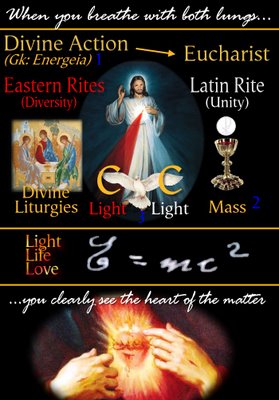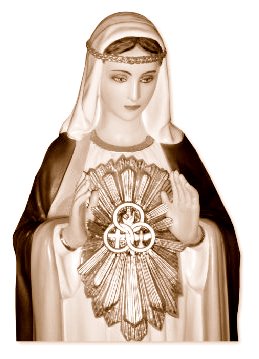The Return of the Rainbow King
¡Viva Cristo Rey!
 |
| The above close-up is taken from the original full image at Goodsalt.com |
A gift from an Anglican convert
http://mystra.wordpress.com/2009/11/22/christ-the-universal-king/
Christ the Universal King
The image of Monarchy is also one which continues to evoke a sense of great wonder in us. Although today the idea of the Monarch is so debased (for many tourists a glimpse of the British Royal Family is a part of what draws them to the palaces and houses of England, and that for many British people a tea party a Buckingham Palace is still a social event of some importance) we can hardly see how it can be said of Christ that he is a King. Or our historical imaginations have been so filled with appalling tyrants (Henry VIII) or sparring relatives (Maude and Stephen) or fops (George IV), that we think of Monarchs as thoroughly disreputable. We are tempted then to minimise Christ’s monarchy, or to interpret it only in terms of his words before Pilate, my kingdom is not of this world, as if that meant no earthly King could or would be like him, or indeed he like them. Yet, on the contrary, the kings of Europe and Byzantium understood themselves in terms of Christ’s kingship (at least, this was the ‘ideal’). They ought not be tyrants on the ancient eastern model, nor figureheads in the way a modern monarch is. People often trace this back to Constantine or Charles the Great, and very much imagine that Jesus did not foresee any such arrangements: these two great Roman and Frankish emperors simply used the monotheistic principle to back up the monarchical one, and so used Christianity to their own advantage. But there was another, civilising, side to the arrangement. If the kings and queens claimed that their authority and right to govern came from God, and that they themselves were an image of Christ the King, there was a consequential obligation upon them to act as if they really believed it. Like all human beings they did not always live up to their obligations, and the example of Ambrose and the Emperor Theodosius shows us that; but it also demonstrates not only (as people like to say) the “power” of the Catholic Church, but also the weight of moral obligation felt by monarchs who had accepted Christianity and the Christian model of kingship. The smaller kings of Mediaeval Europe too experienced this sense that they were to be royal shepherds and some – St. Louis, St. Edward the Confessor are but two examples – lived it out fully.
Christ already reigns through the Church. . .
Jesus Christ is Lord: he possesses all power in heaven and on earth. He is “far above all rule and authority and power and dominion”, for the Father “has put all things under his feet.”. Christ is Lord of the cosmos and of history… Christ dwells on earth in his Church. the redemption is the source of the authority that Christ, by virtue of the Holy Spirit, exercises over the Church. “The kingdom of Christ (is) already present in mystery”, “on earth, the seed and the beginning of the kingdom”…
We are already at “the last hour”. “Already the final age of the world is with us, and the renewal of the world is irrevocably under way; it is even now anticipated in a certain real way, for the Church on earth is endowed already with a sanctity that is real but imperfect.” Christ’s kingdom already manifests its presence through the miraculous signs that attend its proclamation by the Church.
. . . until all things are subjected to him
Though already present in his Church, Christ’s reign is nevertheless yet to be fulfilled “with power and great glory” by the King’s return to earth. This reign is still under attack by the evil powers, even though they have been defeated definitively by Christ’s Passover. Until everything is subject to him, “until there be realized new heavens and a new earth in which justice dwells, the pilgrim Church, in her sacraments and institutions, which belong to this present age, carries the mark of this world which will pass, and she herself takes her place among the creatures which groan and travail yet and await the revelation of the sons of God.” That is why Christians pray, above all in the Eucharist, to hasten Christ’s return...
Thank you anonymous author
of mystra nova
I am praying for you
Sincerely yours in Jesus through Mary,
Mike Rizzio
Imitate Mary
Become like Jesus
Live for the Triune God
Seek the Light of Our Lord Jesus Christ
See you on the High Ground!
* - J.M.J. + O.B.T. + M.G.R. stands for:
Jesus, Mary and Joseph;
O Beata Trinitas;
St. Michael, St. Gabriel and St. Raphael






























No comments:
Post a Comment